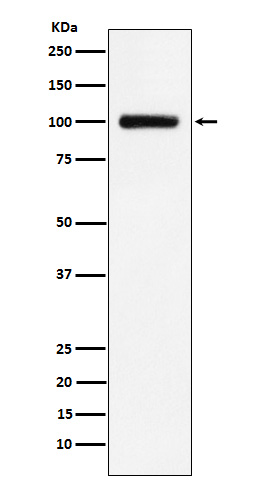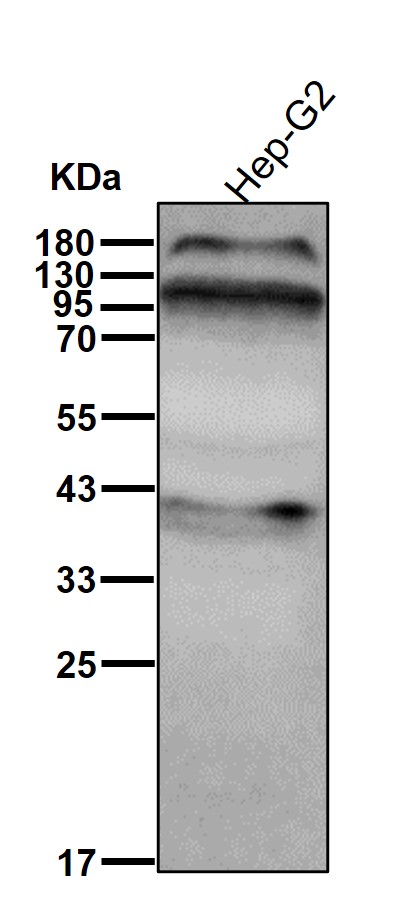

| WB | 咨询技术 | Human,Mouse,Rat |
| IF | 咨询技术 | Human,Mouse,Rat |
| IHC | 1/100-1/200 | Human,Mouse,Rat |
| ICC | 技术咨询 | Human,Mouse,Rat |
| FCM | 咨询技术 | Human,Mouse,Rat |
| Elisa | 咨询技术 | Human,Mouse,Rat |
| Aliases | HFE3; TfR2; TFRC2;;Transferrin receptor 2 |
| WB Predicted band size | Calculated MW: 89 kDa ; Observed MW: 100 kDa |
| Host/Isotype | Rabbit IgG |
| Antibody Type | Primary antibody |
| Storage | Store at 4°C short term. Aliquot and store at -20°C long term. Avoid freeze/thaw cycles. |
| Species Reactivity | Human |
| Immunogen | A synthesized peptide derived from human Transferrin receptor 2 |
| Formulation | Purified antibody in PBS with 0.05% sodium azide,0.05% BSA and 50% glycerol. |
+ +
以下是3篇关于Transferrin Receptor 2(TFR2)抗体的参考文献,按研究内容和应用场景概括:
1. **"Transferrin receptor 2 is a component of the erythropoietin receptor complex and is required for efficient erythropoiesis"**
- **作者**: Forejtniková H, et al.
- **摘要**: 研究通过Western blot和免疫组化分析,使用TFR2特异性抗体揭示了TFR2在红细胞生成中与促红细胞生成素受体的相互作用,表明TFR2缺陷会导致红细胞成熟障碍。
2. **"Hereditary hemochromatosis protein, HFE, interaction with transferrin receptor 2 suggests a molecular mechanism for mammalian iron sensing"**
- **作者**: Goswami T, et al.
- **摘要**: 利用TFR2抗体进行免疫共沉淀实验,发现HFE蛋白与TFR2在肝细胞中的直接结合,提出TFR2-HFE复合物通过调控铁调素(hepcidin)表达参与体内铁稳态调控。
3. **"Regulation of TMPRSS6 by transferrin receptor-2: a novel link between systemic iron homeostasis and erythropoiesis"**
- **作者**: Silvestri L, et al.
- **摘要**: 通过免疫印迹和流式细胞术,研究TFR2抗体检测的蛋白表达水平变化,证明TFR2通过调控TMPRSS6(一种膜蛋白酶)影响铁调素信号通路,从而连接铁代谢与红细胞生成。
4. **"Transferrin receptor 2 is critical for iron homeostasis in vivo"**
- **作者**: Kawabata H, et al.
- **摘要**: 使用TFR2敲除小鼠模型及TFR2抗体进行组织染色,证实TFR2在肝脏铁调素表达调控中的核心作用,缺乏TFR2会导致严重铁过载和血色素沉着症表型。
这些文献均涉及TFR2抗体的实验应用(如蛋白检测、互作分析或病理机制研究),可作为铁代谢或相关疾病研究的参考。
The transferrin receptor 2 (TfR2) antibody is a crucial tool for studying iron metabolism and related disorders. TfR2. a member of the transferrin receptor family, is primarily expressed in the liver, particularly in hepatocytes, and plays a regulatory role in systemic iron homeostasis. Unlike TfR1. which is ubiquitously expressed and mediates cellular iron uptake, TfR2 interacts with HFE protein to modulate hepcidin expression, a hormone controlling iron absorption and recycling. Dysregulation of TfR2 is linked to hereditary hemochromatosis, iron overload disorders, and hepatocellular carcinoma.
TfR2 antibodies are designed to detect specific epitopes on the TfR2 protein, enabling researchers to study its expression, localization, and function. These antibodies are widely used in techniques like Western blotting, immunohistochemistry, and flow cytometry to analyze tissue-specific or disease-associated TfR2 expression patterns. Some antibodies target extracellular domains for cell surface detection, while others recognize intracellular regions for signaling studies. Validated TfR2 antibodies often undergo knockout cell line verification to ensure specificity, given the structural similarities between TfR2 and TfR1. Recent studies employ TfR2 antibodies to explore its role in iron-sensing pathways, cancer progression, and therapeutic targeting. Commercial variants include monoclonal and polyclonal formats from hosts like rabbit or mouse, optimized for different experimental applications.
×